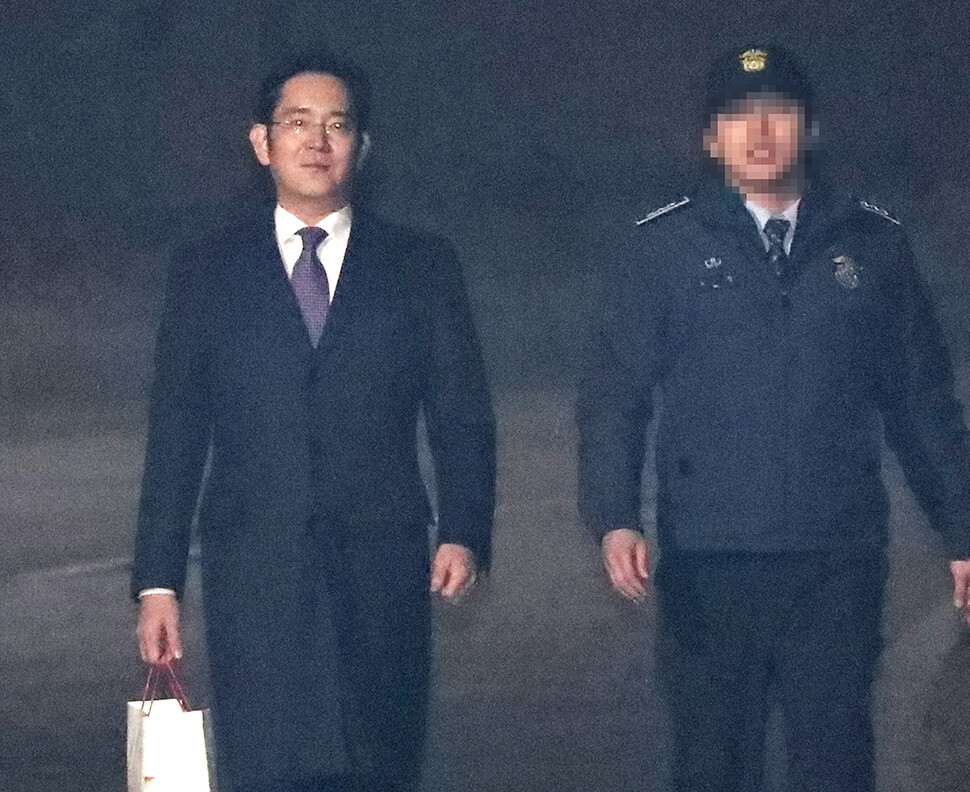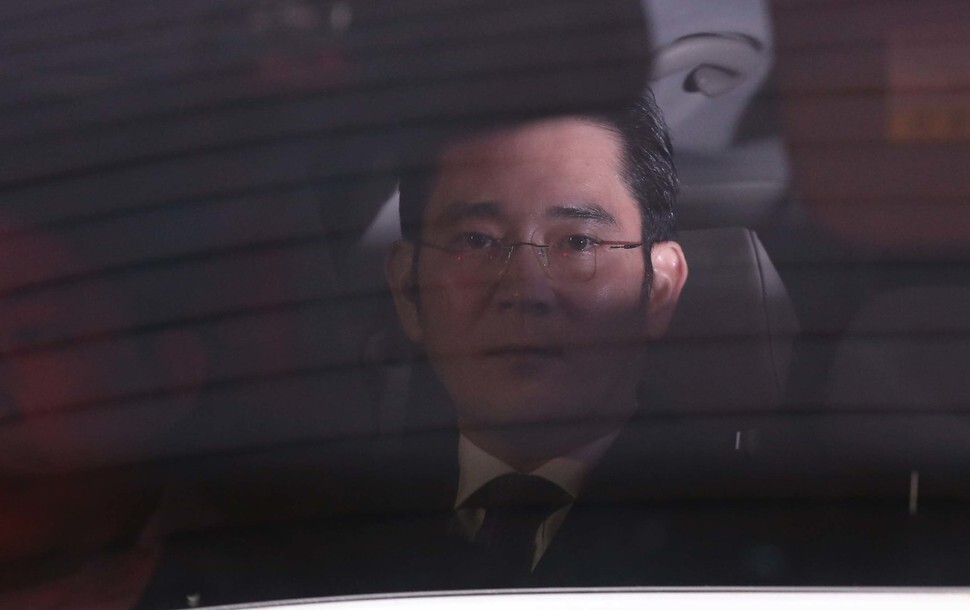hankyoreh
Links to other country sites 다른 나라 사이트 링크
Court denies arrest warrant for Samsung Vice Chairman Lee Jae-yong

On Jan. 19, a South Korean court denied a request for an arrest warrant against Samsung Electronics Vice Chairman Lee Jae-yong, 49, who is suspected of having given a bribe to South Korean President Park Geun-hye. This represents a major hitch in Special Prosecutor Park Young-soo’s plan to use charges that Lee gave a bribe as a stepping stone to investigate charges that President Park Geun-hye received that bribe. The Special Prosecutor’s investigative team is carefully examining the court’s rationale for rejecting the request for an arrest warrant and considering resubmitting the request.
Jo Ui-yeon, the judge who is in charge of warrants at the Seoul Central District Court, rejected the Special Prosecutor’s request for an arrest warrant after conducting pre-arrest questioning of Lee on Jan. 18. Lee returned home after being released from the Seoul Detention Center, located in Uiwang, Gyeonggi Province.
Lee is accused of having provided a total of 43.3 billion won (US$36.5 million) to Park Geun-hye in exchange for receiving the government’s help in completing the transfer of management rights over the Samsung Grou] by expanding his control over Samsung Electronics. He is also accused of having embezzled 9.6 billion won of company funds from Samsung Electronics as part of the bribe he allegedly gave to Park. Finally, he is accused of having committed perjury before the National Assembly’s special investigative committee on Dec. 6 in regard to the financial support that was provided to Choi Sun-sil (61, in jail facing charges) and her daughter Jung Yu-ra, 21.
The court’s denial of the request for an arrest warrant against Lee appears to be based on its acceptance of Lee’s argument that he was not directly involved in the process of providing financial support to Park.
The court said in the ruling, “It is difficult to recognize the necessity, reason and appropriateness of the arrest at the current stage,” adding that there is room for prosecution to be debated.
The court’s decision also appears to reflect Lee’s secondary defense, which acknowledges that Park was given financial support but contends that this support was given not voluntarily but rather under coercion from Park.
The Special Prosecutor’s team argued that it was necessary to arrest Lee because it believes that he was instrumental in mobilizing Samsung Electronics to provide Park with financial benefits in order to receive in return assistance with the handover of management rights. But in light of the criminal charges against Lee that the Special Prosecutor listed on the arrest warrant, the court apparently concluded that there was no clear quid pro quo in the money that Lee gave to Park. Since Lee is completely denying the charges against him, the court further seems to have concluded that the arrest was unnecessary and that his right to defend himself should be guaranteed.

Previously, the prosecutors’ special investigative office estimated the total amount of bribes that Lee gave Park, including donations to the Mir and K-Sports Foundations and financial support for Chung Yoo-ra’s equestrian training. The special office not only had been limited in the time available for its investigation, but it had also been unable to prove the reciprocal nature of the money because of stonewalling by Samsung’s Future Strategy Office director Jang Choong-gi, deputy director Choi Gee-sung and Samsung Electronics chief of external affairs Park Sang-jin. So the special office handed the baton to the Special Prosecutor, who was about to launch his investigation. At the time, the special investigative office had tentatively concluded that Lee had voluntarily given the money under coercion by Park.
Since starting its investigation on Dec. 21, the Special Prosecutor’s team has been concentrating on finding a quid pro quo in the financial transaction between Lee and Park by carrying out a robust investigation into the National Pension Service’s support for the merger between Samsung C&T and Cheil Industries. The Samsung merger was the critical first step in preparing for the transfer of management rights to Lee, and the National Pension Service‘s decision to support the merger was engineered by Park and Choi, who are at the heart of the scandal, as a plot designed for their own private gain.
After acquiring direct and indirect evidence that Park and Choi shared financial interests, the Special Prosecutor’s team confirmed that Park used her various powers as president to instruct the National Pension Service to support the Samsung merger (a crucial step in Lee‘s inheritance of management rights) in return for securing donations to the Mir and K-Sports Foundations and financial support for Jung’s equestrian training.
After telling the prosecutors‘ special investigative office that he had not known about Choi, Lee has been telling the Special Prosecutor’s team that he only learned the whole story after giving the financial support. Lee also explained that the Future Strategy Office had been put in charge of decision-making at the Samsung Group during Lee Kun-hee’s tenure as chairman of Samsung Electronics and that Choi Gee-sung, deputy director of the office, was in the position of actually exercising that authority. Because of this, Lee claims, he only acted as a messenger, receiving requests (that were more like demands) from Park and passing them along to Choi.
Since the Special Prosecutor’s team had sought to tackle the bribery case against Park head on by treating Lee’s succession to management rights as the key link in the case, the court’s rejection of its request for an arrest warrant against Lee means that it is now in the position of having to redraw the basic outline of its investigation.
The crime of bribery implies the simultaneous prosecution of the person who gave the bribe and the person who received it. The crime consists of an exchange of favors between the two parties in a transaction. Therefore, the court’s agreement about the need to arrest Lee, who is accused of having given a bribe, would have made it much easier to determine that Park, the other party in the transaction, had accepted the bribe. But the attempt to prove quid pro quo in the money that Lee allegedly gave as a bribe has already run into trouble during the court’s review of the arrest warrant request.
The Special Prosecutor’s team is currently considering two options. The first is to carefully examine the court’s reason for overturning the arrest warrant and resubmitting its request for the warrant against Lee after strengthening its analysis of the evidence. The second option is to charge Lee without detention and to move on to investigating Park. But given the difficulty of investigating Park without even having convinced the court reviewing the arrest warrant that there is quid pro quo in the bribery charges against Lee, the Special Prosecutor is leaning toward resubmitting the request for an arrest warrant after continuing the investigation to shore up the charges.
The Special Prosecutor’s team is planning to augment its evidence of quid pro quo by examining not only the merger but every stage of the roadmap to hand over management rights to Lee. This also represents the effort to demolish Samsung’s counterargument that Lee could not have been motivated to ask for favors since the money was given to Park after the Samsung merger occurred.
In order to complete the transfer of management rights to Lee, there are quite a few hurdles to clear. One is disentangling the new cross-shareholding structure resulting from the merger of Samsung C&T and Cheil Industries. Another is clearing the way for Samsung Electronics‘ conversion into a holding company by introducing legislation about intermediate financial holding companies that would revise the Fair Trade Act and relax regulations on the separation of financial and industrial capital. In order to refute Samsung’s arguments, the Special Prosecutor‘s team believes, it must show that Park was implicated in the various tasks required for the succession of management rights.
By Kim Jeong-pil, staff reporter
Please direct questions or comments to [english@hani.co.kr]

Editorial・opinion
![[Column] Season 2 of special prosecutor probe may be coming to Korea soon [Column] Season 2 of special prosecutor probe may be coming to Korea soon](https://flexible.img.hani.co.kr/flexible/normal/500/300/imgdb/original/2024/0426/3317141030699447.jpg) [Column] Season 2 of special prosecutor probe may be coming to Korea soon
[Column] Season 2 of special prosecutor probe may be coming to Korea soon![[Column] Park Geun-hye déjà vu in Yoon Suk-yeol [Column] Park Geun-hye déjà vu in Yoon Suk-yeol](https://flexible.img.hani.co.kr/flexible/normal/500/300/imgdb/original/2024/0424/651713945113788.jpg) [Column] Park Geun-hye déjà vu in Yoon Suk-yeol
[Column] Park Geun-hye déjà vu in Yoon Suk-yeol- [Editorial] New weight of N. Korea’s nuclear threats makes dialogue all the more urgent
- [Guest essay] The real reason Korea’s new right wants to dub Rhee a founding father
- [Column] ‘Choson’: Is it time we start referring to N. Korea in its own terms?
- [Editorial] Japan’s rewriting of history with Korea has gone too far
- [Column] The president’s questionable capacity for dialogue
- [Column] Are chaebol firms just pizza pies for families to divvy up as they please?
- [Column] Has Korea, too, crossed the Rubicon on China?
- [Correspondent’s column] In Japan’s alliance with US, echoes of its past alliances with UK
Most viewed articles
- 1[Column] Season 2 of special prosecutor probe may be coming to Korea soon
- 2‘We must say no’: Seoul defense chief on Korean, USFK involvement in hypothetical Taiwan crisis
- 3Is N. Korea threatening to test nukes in response to possible new US-led sanctions body?
- 4Amnesty notes ‘erosion’ of freedom of expression in Korea in annual human rights report
- 5Division commander ordered troops to enter raging flood waters before Marine died, survivor says
- 6N. Korean delegation’s trip to Iran shows how Pyongyang is leveraging ties with Moscow
- 7[Editorial] Korea’s surprise Q1 growth requires objective assessment, not blind fanfare
- 8Is Japan about to snatch control of Line messenger from Korea’s Naver?
- 9No good, very bad game for Korea puts it out of Olympics for first time since 1988
- 10[Reportage] On US campuses, student risk arrest as they call for divestment from Israel